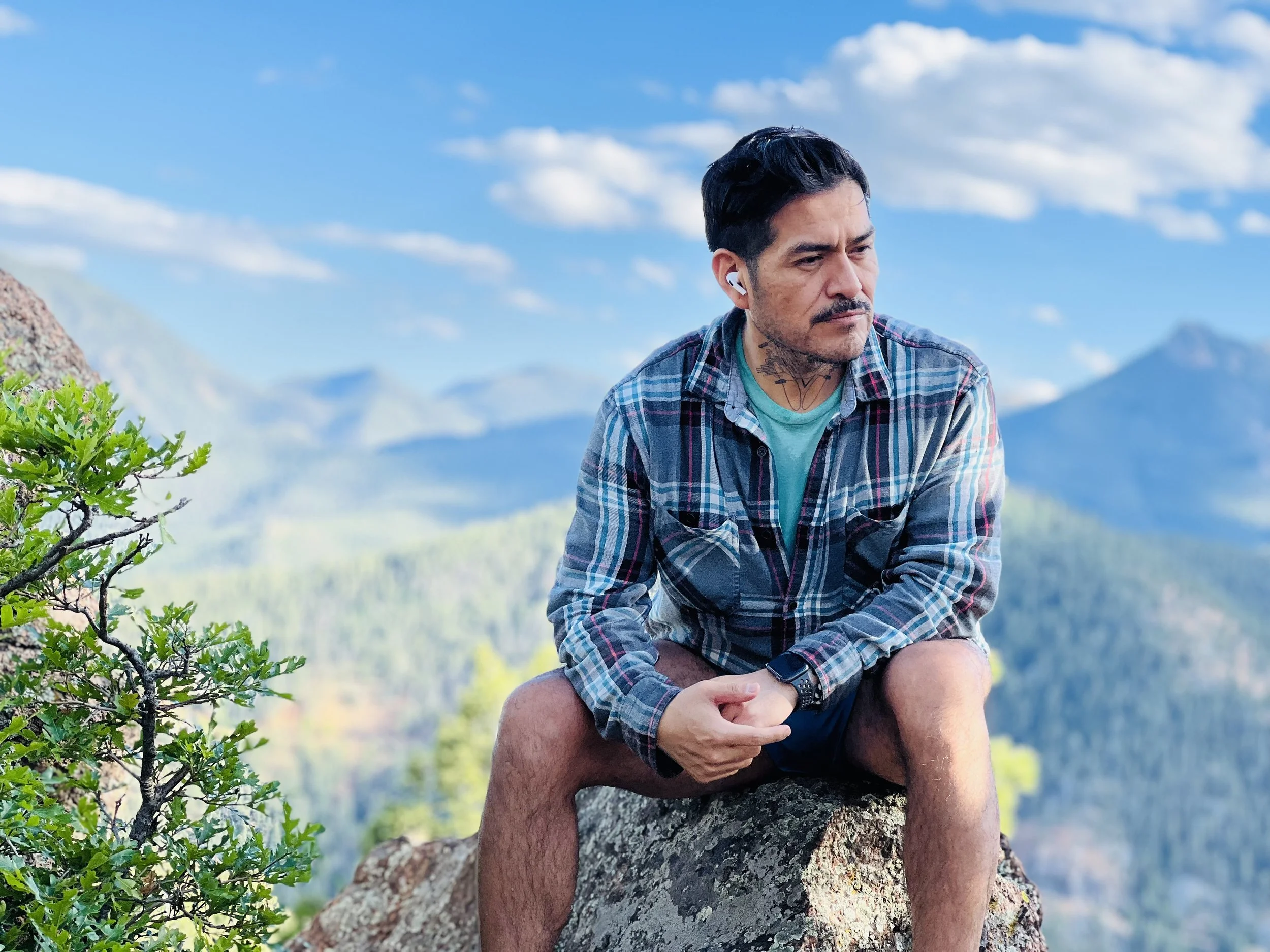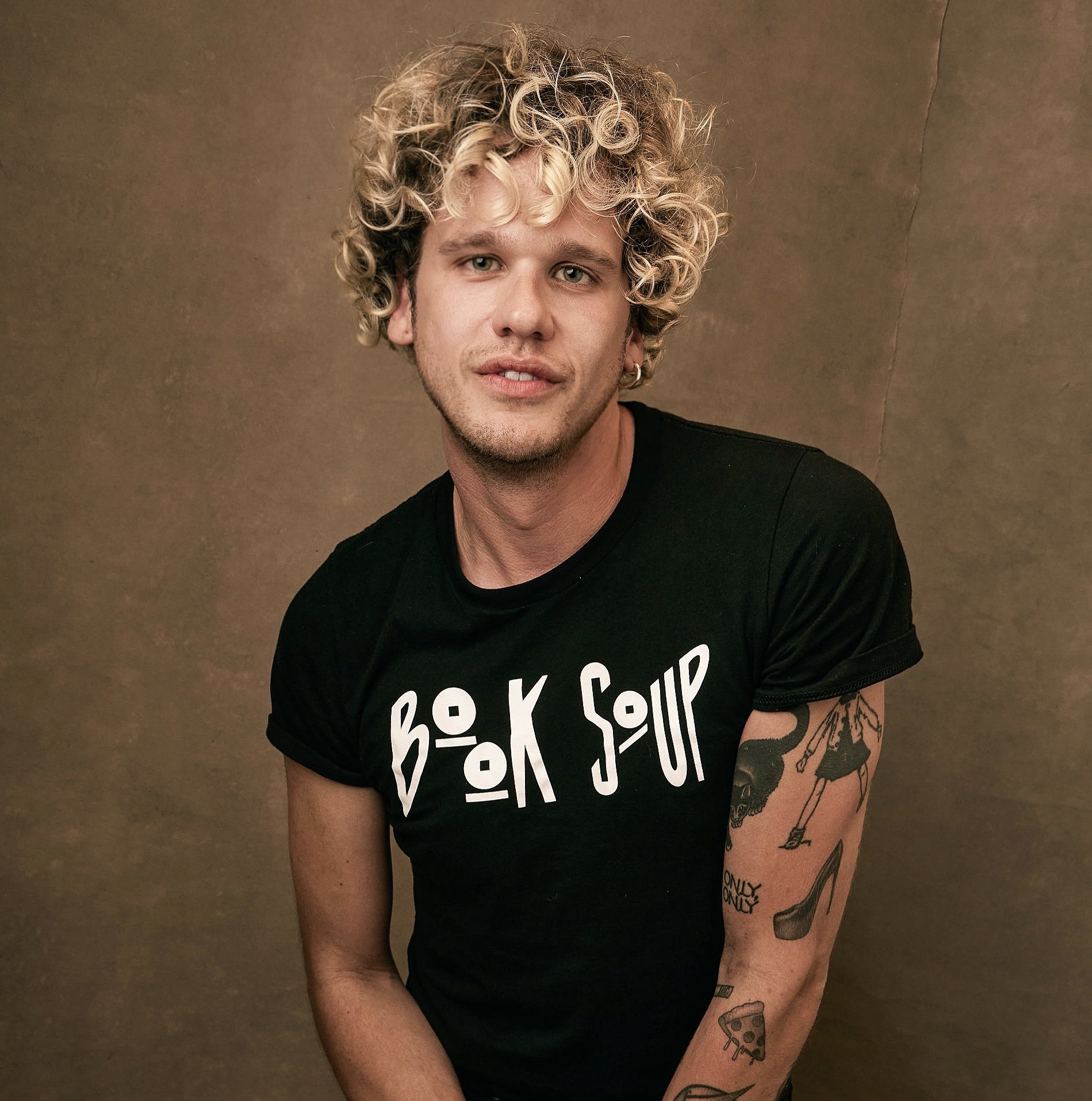Morning workshops
The intimate and interactive workshops are restricted to ten participants each. Outside of our juried Master Class, no writing sample is required to register. Workshops meet all three mornings of the conference, Thursday through Saturday from 9:00 a.m. to 12:00 p.m. PDT. The conference must be attended in-person; no online or hybrid option is available.
Participants in all workshops will be expected to submit work in their workshop genre in advance of the conference and to read and comment on the work of others. Submission requirements for each workshop will be provided in the spring.
Scholarship and Master Class applications will open in early January of 2026. General registration will open in early April of 2026.
THE 2025 LINE-UP
MASTER CLASS
The Memory Map: Land As Memoryscape
Byron F. Aspaas
Writing is a tool for deep reflection inside poetry, creative nonfiction, fiction, as well as any other types of art that exists. Like art, writing can chip away the surface area to create different effigies through texture on the page; writing can paint itself into a creation of different colors inside canyons and scrawls through language; writing can also mold and form and reshape patterns while using different elements to press or scrape or score each line to work in the artist’s favor—linework exists inversely for each creator. As an artist, I have learned writing can be translated into different mediums of different ideas to carve different narratives of a writer’s memory.
To me, light can reveal the inner surfaces and change the temperature of colors throughout different times of the day—and as time fades, memory can be preserved through the art in which holds space inside the contours of craft. As we explore the whitespace of the page and re/create through generative practices, it is my hope to revive and revisit the mysteries of the mind through the different instillations of lyric prose.
As we explore the memoryscape upon story each day, we will remove the different layers of silt to expose the different types of aggregate the minds hold—and to remove each lining of sediment will then reveal a different bedding. To unearth the mantle then begins.
What holds the story of the memory map?
Please note: this year’s Master Class is juried - applications are open until 11:59 p.m. PT on Friday, February 28, 2025.
-
Raised within the four sacred mountains of Dinétah. Aspaas’s first published work was included in Yellow Medicine Review and since then his writing has appeared in numerous journals and anthologies. Aspaas’s writing revisits the destruction of sacred land and engages his readers in a dialogue about preserving Diné culture and land. He uses imagery and persona to present explorations of language, landscape, and identity. Byron is faculty at San Juan College’s English Department and Western Colorado University’s Graduate Program in Creative Writing Program.
Photo by: Dave Lehl
POETRY WORKSHOP
these are the materials
Brynn Saito
Poetry takes us deep into sensation and to the edge of our senses. How can connecting with the materials of our life—the textures of our day, fragments of sound and memory, detritus of dreams—enliven our poems and reveal our desires? What artifacts and anchors—environments, objects, senses—act as portals to our creative process? Through writing exercises and conversation, we’ll explore the poem as “an instrument for embodied experience,” as Adrienne Rich characterized it. “A poem can’t free us from the struggle for existence,” wrote Rich, “but it can uncover the desires and appetites buried under the accumulating emergencies of our lives.” Poetry is a portal: to desire, silence, truth, ghosts, grief. And the materiality of our embodied aliveness is a gateway, a threshold to poetry’s mysterious and necessary offerings. Along with engaging in generative prompts and discussion, we’ll spend each day reading and providing feedback on participants’ poems. Ultimately, the invitation is to come away with tools for revitalizing your practice and an expanded understanding of poetry’s possibilities and power.
-
Brynn Saito is the author of two chapbooks and three collections of poetry including, most recently, Under a Future Sky (Red Hen Press, 2023). She co-edited with Brandon Shimoda The Gate of Memory: Poems by Descendants of Nikkei Wartime Incarceration (Haymarket Books, 2025). She’s the recipient of the Benjamin Saltman Award and was a finalist for the Northern California Book Award, the Milt Kessler Poetry Book Award, and the Paterson Poetry Prize. Brynn’s writing has appeared in the New York Times, VOGUE, and American Poetry Review, among other journals and anthologies. She’s received funding from the California Arts Council, the California State Library, the Santa Fe Art Institute, Densho, and Hedgebrook. Brynn teaches in the Creative Writing MFA program at Fresno State, located on Yokuts and Mono lands.
Photo by: Evelynne Gomez Greenberg
SHORT FICTION WORKSHOP
fine-tuned fiction: the art of less
Kimberly King Parsons
How do some of our most compelling short story writers distill entire worlds into just a few carefully chosen words?
In this workshop, we'll focus on compression and precision as essential tools for amplifying a story's power. Starting with what already makes each piece distinctive, we'll explore how careful distillation of time, scene, and character—combined with exactness in every word choice—can transform work into its most resonant form. Through close attention to language and dialogue, we'll refine and enhance each writer's natural voice while learning to compress narrative into its vital essence.
Using story openings from masters of the form, we'll also study how the genetic material of an entire narrative often exists in its first paragraphs—a kind of literary DNA that contains the blueprint for everything that follows. These beginnings are where writers plant the seeds of voice, tension, and inevitable surprise.
-
Kimberly King Parsons is the author of the national-bestselling novel We Were the Universe, number two on TIME Magazine’s Best Books of 2024 and a Dakota Johnson Book Club pick the New York Times calls “a profound, gutsy tale of grief’s dismantling power.” Parsons’s debut collection, Black Light, was longlisted for the National Book Award and the Story Prize. A recipient of fellowships from Yaddo and Columbia University, Parsons won the 2020 National Magazine Award for “Foxes,” a story published in The Paris Review. She lives with her partner and children in Portland, Oregon, and teaches fiction in the MFA Writing Program at Pacific University. She is the co-creator of The Fountain, a platform of meditations and visualizations for artists, with the writer Chelsea Bieker.
NOVEL WORKSHOP
writing the novel through characters
Katya Apekina
In this workshop, we will go deep into the characters in your novel—understanding their pasts, their psychology, wants and desires, and worldview.
We will talk about filtering the story through the consciousness of your characters, leaning in to conflict and letting them guide the plot.
-
Katya Apekina is a novelist, screenwriter and translator. Her debut novel, The Deeper the Water the Uglier the Fish, was named a Best Book of 2018 by Kirkus, Buzzfeed, LitHub and others, was a finalist for the LA Times Book Prize and has been translated into Spanish, Catalan, French, German and Italian. Her second novel, Mother Doll, was named a Best Book of 2024 by Vogue. She has published stories in various literary magazines and translated poetry and prose for Night Wraps the Sky: Writings by and about Mayakovsky (FSG, 2008), short-listed for the Best Translated Book Award. Born in Moscow, she grew up in Boston, and currently lives in Los Angeles with her husband, daughter and dog.
SPECULATIVE FICTION WORKSHOP
the magic of the mundane
Allison Saft
How do we introduce readers to the worlds we’ve created? How do we showcase their intricate lore without info-dumping? The most gripping, lived-in, and memorable settings in SFF are those where authors weave magic into the mundane--and those we experience through the eyes of a well-drawn character.
This workshop offers participants a character-first approach to plotting and worldbuilding--one where story choices and speculative elements inform and are informed by the protagonist. We’ll examine how setting details, point of view, and narration style create both emotional depth and immersion.
-
Allison Saft is the New York Times, Sunday Times, and USA Today bestselling author of A Dark and Drowning Tide, A Fragile Enchantment, and other romantic fantasy novels. After receiving her MA in English Literature from Tulane University, she moved from the Gulf Coast to the West Coast, where she spends her time practicing aerial silks. She lives with her partner and an Italian greyhound named Marzipan.
Photo by: Ella Moniz
HYBRID GENRE WORKSHOP
what is that beautiful house: crafting engagiNG settings and playful prose
Tomas Moniz
In this workshop, we will focus on two often overlooked elements of our writing process: setting development and revising the sentence. Setting can play a crucial role in situating your reader as well as invigorating and enriching your prose. Then, we will actually experiment with revising cliches and other sentence level practices. Besides examining and workshopping each other’s writing, participants will leave with a better understanding of the setting's impact on their writing and a few practical approaches to sentence revision.
-
Tomas Moniz is a latinx writer living in East Oakland, CA. His debut novel, Big Familia, was a finalist for the 2020 PEN/Hemingway and the LAMBDA. His new novel, All Friends Are Necessary published by Algonquin Books, was named a finalist for the California Golden Poppy Award. He teaches at Berkeley City College and the Antioch MFA program. He has stuff on the internet but loves penpals: PO Box 3555, Berkeley CA 94703. He promises to write back.
MEMOIR WORKSHOP
memoir, she wrote: mining yourself on the page
Greg Mania
My teaching philosophy is pretty simple: If you care about your story, someone else will, too. My job—and joy—is to help my students hone their craft by looking inward. Because only by looking inward can you learn to write about the way you move through the world. I'm not here to teach as much as I am to hold up a mirror and help you mine your reflection for the things you might not have noticed before or hadn't thought to consider in one way or another—all of the things that make up the fabric of your being, the things that should be radically honored both on and off the page.
This workshop combines creative writing exercises, group discussions, and transformative revision techniques.
-
Greg Mania is a writer whose words have been published in The New York Times, The New Yorker, Vanity Fair, HuffPost, and elsewhere. He is the author of the celebrated debut memoir, Born to Be Public, which was named a Best Book of 2020 by NPR, O, The Oprah Magazine, Electric Literature, among others. He lives in Los Angeles, where he co-hosts Empty Trash, a bi-monthly reading series. He is currently working on his debut novel.
NONFICTION WORKSHOP
EXPERIMENTS IN FORM
Sarah Gerard
Creative nonfiction writers borrow techniques from many disciplines, forms, and genres, and are continually expanding the field into singular new modes of expression. This workshop lays out a process for writers to navigate what can often feel like uncharted territory in nonfiction. We will practice finding unique forms for our expressions by focusing on the critical elements of material, shape, and voice.
All artists use materials and it is from them that we discover the shape and voice of our work. This class gives you tools for generating and gathering material through writing practices and research methods, as well as for crafting your materials according to their organizing patterns, metaphors, and themes, and contending with the element of time. Through this process of refining, you will see your work animated with ideas, emotion, and story.
Each day, the class will engage in generative discussion and skill practice, and will read and provide feedback for participants’ writing. In-class readings will be provided. The goal is to come away from the class feeling empowered and energized to adventure into big projects.
-
Sarah Gerard is an award-winning author of four fiction and nonfiction books including Sunshine State: Essays and, most recently, Carrie Carolyn Coco: My Friend, Her Murder, and an Obsession With the Unthinkable. Her next novel is forthcoming from Zando Projects in 2026. She is a private investigator in Denver.
Photo by: Lens of Lakhani
MIDDLE GRADE/YOUNG ADULT (MG/YA) WORKSHOP
FINDING YOUR VOICE
Rosiee Thor
What is voice? This concept discussed by publishing professionals can sometimes be the deciding factor between publication and rejection, but how do we develop it? How do we learn from others while still keeping our own voice fresh? It all comes down to your unique way of writing and the subtle techniques you can use to alter reader emotions, expectations, and experience.
In this workshop, we will dive into the elements of voice--the style choices and unique facets of your writing that make it yours. In young adult and middle grade, voice is key to hooking young readers early and keeping them engaged. Learn to grab your reader's attention from the start by honing your voice, developing perspective, and creating characters readers will cherish.
-
Rosiee Thor began their career as a storyteller by demanding to tell their mother bedtime stories instead of the other way around. They spent their childhood reading by flashlight in the closet until they came out as queer. Now, they write stories for all ages, including young adult novels Tarnished Are The Stars and Fire Becomes Her, the picture book The Meaning of Pride, and tie-in novels for franchises like Life is Strange and Firefly. Their short fiction appears in anthologies including the Lambda award nominated Being Ace, and they are the editor of Why On Earth: An Alien Invasion Anthology and This is How We Roll. Their debut cozy mystery, The Dead & Breakfast, is forthcoming from Berkley Press and co-written by Kat Hillis. Rosiee lives in Oregon with a dog, two cats, and an abundance of plants.
SELF-PUBLISHING WORKSHOP
SELF-PUBLISHING CRASH COURSE
Kit Vincent
In the highly competitive and ever evolving publishing landscape, self-publishing might just be the right path for you to bring your creative work into the world and start connecting with your readers!
In this workshop, you will learn the steps to self-publishing: from preparing your manuscript for various retailers to building your author platform and positioning your work in the marketplace. We’ll look into best practices to finding a great editor and cover artist. We’ll learn to write an effective blurb, set up an advertising campaign, and find the best genre and keywords for your work. We will also go over the opening of your manuscript to make sure it grabs the reader and keeps them turning those pages!
-
Kit Vincent is the bestselling author of LGBTQ+ Science Fiction and Fantasy, including Love Immortal and Us, Et Cetera. Kit’s books have been featured in The New York Times Book Review and Boston’s local NPR Arts and Culture. In addition to writing stories, Kit has moved continents as a first-generation immigrant, produced award-winning indie films, studied film scoring at UCLA, and is a proud parent of a potbelly pig and two rescued tortoises.
Kit is third gender (any pronoun) and is based in New England.
TRADITIONAL PUBLISHING WORKSHOP
breaking into traditional publishing: catchy pitches and compelling first pages
Adriana Mather
You’re writing a book? Amazing! But now what? Completing a manuscript is only the beginning of a publishing journey. If you want to break into traditional publishing, getting a literary agent is a must. But who is right for your genre and how do you approach them? We will learn all these first steps along with polishing your first pages so that your hook shines and your voice sings. We will also learn how to craft a catchy pitch and write a thoughtful query so that your submissions will leave everyone wanting more!
-
Adriana Mather is the New York Times bestselling author of the How to Hang a Witch series and the Killing November series, with family roots that go back to Sleepy Hollow, the Salem Witch Trials, and the Titanic. Most recently she has embraced her love of swoon with her newest novels Mom Com and The Breakup Artists. She's also an actor and producer and co-owns Zombot Pictures, a production company that makes feature films.












